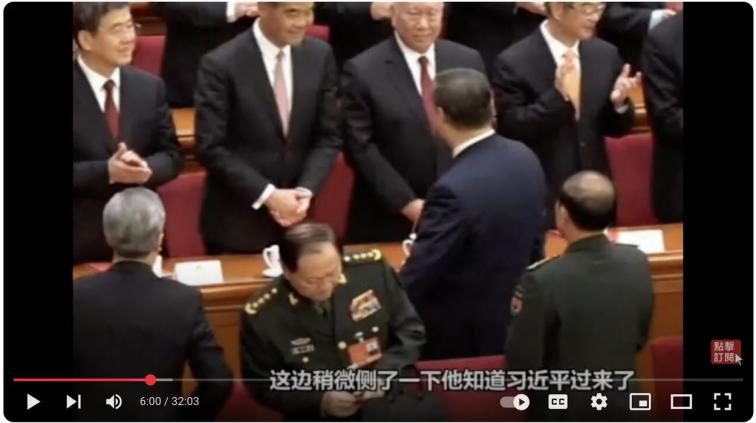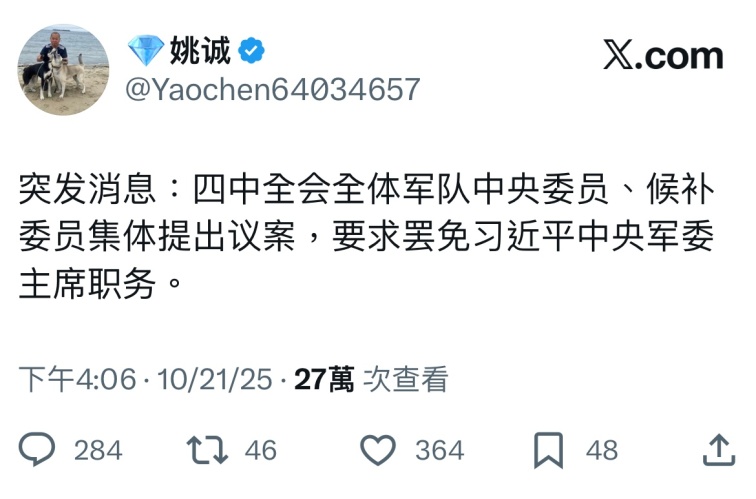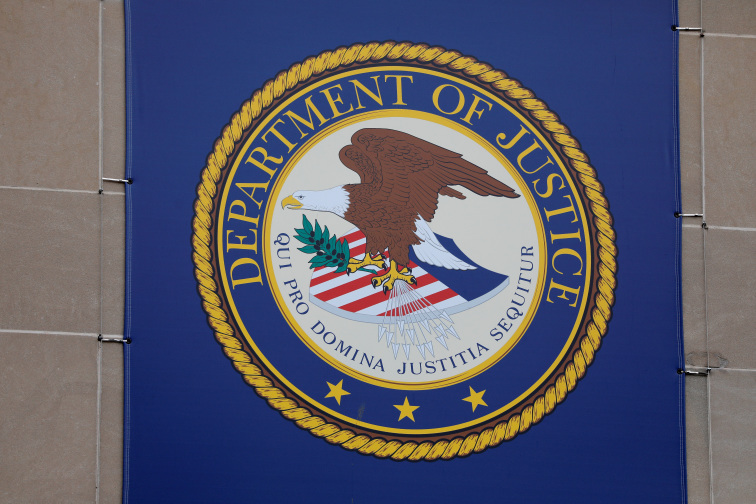Dark clouds loom over Beijing’s Tiananmen Square. (Feng Li/Getty Images)
[People News] The communiqué from the Fourth Plenary Session has been released. According to Xinhua News Agency, the meeting has decided to appoint Zhang Shengmin as the Vice Chairman of the Military Commission. Additionally, numerous officials have been dismissed, signalling a collapse of power within both the military and political systems, resulting in significant personnel upheaval. Meanwhile, Trump has recently announced plans to meet with Xi Jinping in South Korea to sign a trade agreement. What underlying implications might this hold?
Firstly, a comparison of the two Fourth Plenary Sessions indicates that Xi Jinping is struggling to find loyal ministers.
Public records show that Zhang Shengmin was born in August 1958 and is from Wugong, Shaanxi. He currently holds several positions: a member of the 20th Central Committee, a member of the Central Military Commission, Deputy Secretary of the Central Commission for Discipline Inspection, Secretary of the Central Military Commission's Discipline Inspection Commission, Director of the Central Military Commission's Supervisory Commission, and Party Secretary, holding the rank of General in the Rocket Force.
In addition to Zhang Shengmin's promotion, the communiqué indicates the addition of 11 Central Committee members. Compared to the 168 members and 147 alternate members from the 20th National Congress, the Fourth Plenary Session now has 205 Central Committee members and 171 alternate members, reflecting a decrease of 37 Central Committee members and 24 alternate members, totalling 61.
When comparing this communiqué to that of the 19th Fourth Plenary Session, several key features emerge:
1. In terms of overall direction, the previous session emphasised the four 'confidences', while this Fourth Plenary Session focuses on the 'two establishments', 'two safeguards', and the stability of the Chinese-style modernisation path;
2. In terms of policy, the previous session highlighted institutionalisation, legalisation, and systematisation, whereas this session emphasises planning, economic development, modernisation, and strengthening execution.
3. Ideologically, the previous meeting fully established 'Xi Jinping's Thought on Socialism with Chinese Characteristics for a New Era' as the core guiding ideology for the first time, and this session introduced new concepts such as 'new quality productive forces' and 'technological self-reliance and self-improvement'.
4. Regarding power, the last meeting emphasised the leadership of the 'Party' in all matters. In comparison to the communiqué from the Fourth Plenary Session of the 19th Central Committee, this meeting highlighted Xi Jinping's 'core' status while adding the phrase 'insisting on leading social revolution through the Party's self-revolution'.
5. In military terms, the last meeting stressed that 'the Party commands the gun', while this meeting explicitly set forth the 'goal of building the army in a hundred years', a 'new three-step strategy', and the need to 'strengthen combat readiness while simultaneously fighting and building'.
6. On the ideological front, the last meeting promoted 'the superiority and confidence of the system', whereas this meeting proposed 'advancing national rejuvenation through Chinese-style modernisation'.
7. Economically, the last meeting advocated for the integration of the socialist basic economic system with the market economy, while this meeting emphasised new development concepts, a dual circulation strategy (domestic and international), and a technology-driven approach.
8. In terms of anti-corruption, the last meeting focused on 'institutional governance of the Party' and a 'comprehensive and strict governance system of the Party', while this meeting highlighted 'self-revolution leading social revolution' and the need for 'normalising and institutionalising style construction'.
9. Personnel-wise, there was no turbulence in the last meeting, but this time, personnel adjustments were notably significant.
Keywords from the last meeting included: system, governance, rule of law, system, advantages, confidence; while keywords from this meeting included: high-quality development, new quality productive forces, technological self-reliance, strong country construction, and strong military goals.
In summary, the Fourth Plenary Session highlighted Xi Jinping's personal leadership authority, the military's signals regarding potential foreign conflicts, and the evident signs of power transitions within both the party and the military. This raises the question: why has Xi Jinping taken action against so many officials? Is it truly due to corruption? The answer is no; this reflects Xi Jinping's inability to address the issue of 'loyalty.' As he seeks to confront the United States, the Cold War could escalate into a hot war. How many individuals within the party, government, and military are willing to sacrifice their lives to secure Xi Jinping's reign and ensure his power endures for generations? Despite his position, Xi Jinping has become increasingly isolated.
Secondly, the meeting between Trump and Xi could reshape the global landscape.
According to the United Morning Post, on Wednesday (22nd), Trump mentioned in a media interview that he will meet with Xi Jinping in South Korea next week. The two nations are expected to reach agreements on importing American soybeans, Russian oil, ending the Russia-Ukraine war, and even addressing nuclear weapons issues. Trump indicated that they would discuss the Chinese Communist Party's purchase of Russian oil and strategies to halt Russia's actions in Ukraine. He confidently asserted, 'I believe we will reach an agreement.' Trump is convinced that Xi Jinping has altered his perspective on the Ukraine conflict and is now open to discussions about ending the war. 'He now wants to—I'm not sure if he truly wanted to at the outset—but he now wishes to conclude this war.'
As the news spread, public attention turned to whether Trump was endorsing Xi Jinping, but the crucial aspect lies in Xi Jinping's unexpected shift regarding the Russia-Ukraine situation.
According to a report by the Chosun Ilbo, U.S. President Trump is set to hold a summit with Xi Jinping on the 20th to sign a trade agreement. If no agreement is reached, tariffs on imported Chinese goods could increase to 155% starting November 1. Trump stated that the U.S. has 'leverage' such as tariffs and aircraft parts to counter the Chinese Communist Party's control over rare earth exports.
Before this, U.S. Treasury Secretary Mnuchin and Chinese Vice Premier He Lifeng will meet this week in Malaysia to coordinate discussion topics and finalize the agenda for the Trump-Xi talks.
The timing of this meeting is scheduled after the Fourth Plenary Session, which appears to be a diplomatic breakthrough following Xi Jinping's internal reforms, but in reality, it indicates a reluctant shift in strategy.
Thirdly, Trump takes decisive action to deter Beijing, compelling Xi Jinping to pivot immediately.
On the eve of the Fourth Plenary Session, a significant piece of news from the U.S. sent shockwaves through Zhongnanhai. The U.S. has indicted Chen Zhi, a suspected member of Xi Jinping's white-glove princeling group, and confiscated his Bitcoin valued at $15 billion, approximately 107 billion yuan. The U.S. has warned the Chinese Communist Party that it is aware of the methods and locations used by various prominent families within the CCP to hide their wealth. The sensitive timing has led many to believe that this incident is far from coincidental.
In a related development, media personality Zhai Shanying disclosed that senior CCP officials recently approached him through intermediaries to seek financial channels for money laundering, with the first tranche of funds amounting to as much as 500 billion yuan. Zhai Shanying sarcastically remarked that while mid- and lower-level CCP officials are imprisoned for embezzling small sums, it is indeed a pity.
Zhai Shanying provides a deeper analysis of the economic dynamics of the Chinese Communist Party (CCP) by examining the money supply, specifically M1 (circulating currency plus corporate demand deposits) and M2 (M1 plus household deposits, corporate time deposits, and other deposits). This analysis helps to clarify where the CCP's wealth truly resides.
According to the financial report for September, China's M1 stands at 113 trillion yuan, while M2 is at 335 trillion yuan, resulting in a significant gap of 222 trillion yuan. Zhai Shanying points out that this disparity does not arise from household and corporate savings, but rather reflects the actual amount of money controlled by Xi Jinping and his close party allies. This also indirectly sheds light on why Australia's media mogul, Yang Lanlan, possesses such considerable wealth.
Zhai Shanying argues that the CCP's top officials are eager to launder money due to their fear that Western societies will not recognise the legitimacy of their wealth. As a result, they aim to utilise financial mechanisms and cross-border transactions to transfer money from the mainland into the international financial system. This speculation suggests that the money laundering chain revealed by the death of Yu Menglong may be closely linked to Mango Super Media and Tianyu Media.
On the eve of the Fourth Plenary Session, Trump targeted Xi Jinping's associates, an action perceived as a political warning to Beijing, compelling Xi to alter his position on the Russia-Ukraine conflict.
While the Fourth Plenary Session outwardly showcased Xi Jinping's consolidated power, it actually highlighted a political isolation where no one is willing to sacrifice for him. The Xi-Trump meeting, which appeared to be a diplomatic breakthrough, was in fact a reluctant pivot under pressure. This series of events underscores Xi Jinping's dilemma: as power becomes more concentrated, his political isolation deepens.
(First published in People News)
△











News magazine bootstrap themes!
I like this themes, fast loading and look profesional
Thank you Carlos!
You're welcome!
Please support me with give positive rating!
Yes Sure!